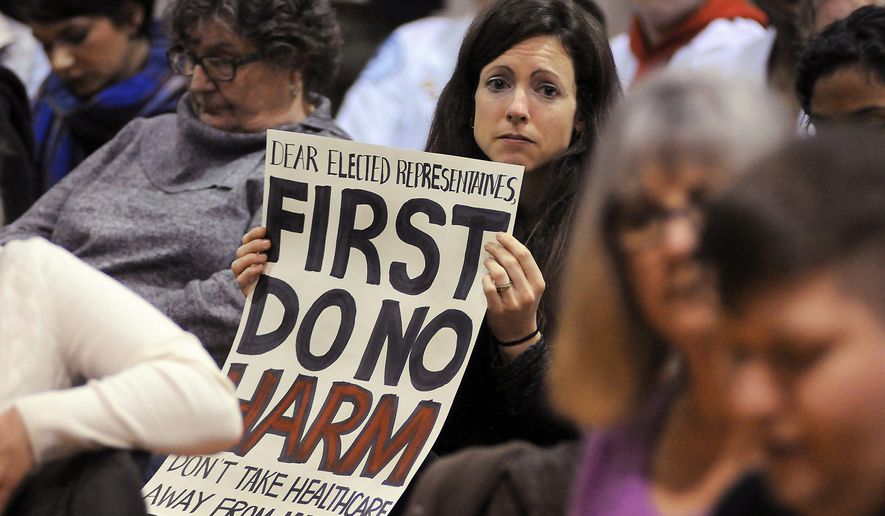President Trump’s prime-time appeal to scrap Obamacare energized Republicans but did little to bridge the divide between GOP factions jockeying for position in the push to repeal and replace the law before moving on to tax reform and other fights.
House Speaker Paul D. Ryan seized momentum, though, saying Mr. Trump’s pitch to include tax credits in any Obamacare replacement signaled the White House and Congress are reading from the same playbook, as conservatives threaten to block an emerging plan crafted by leaders and key committee chairmen.
“Paul Ryan was standing up before he got halfway through that sentence and applauding, because he was happy to hear some support. I think that helps,” Sen. Rob Portman, Ohio Republican, said of Mr. Trump’s address to Congress late Tuesday.
An emerging House GOP proposal would dole out refundable, age-based tax credits to people who purchase insurance on their own, while paying for it by taxing a portion of particularly generous employer-sponsored plans.
Conservatives have cast the plan as a new entitlement, or “Obamacare lite,” and an obstacle to the repeal effort that Mr. Trump and GOP lawmakers cheered on late Tuesday.
A trio of Senate Republicans say the party reached consensus on a 2015 bill that gutted Obamacare, so that should be the starting point before lumping in replacement ideas. They also want Congress to allow people to deduct the cost of health insurance instead of tapping into the employer-based system.
“If they give you back some of your own money, that’s not an entitlement program. If they give you back somebody else’s money, that’s an entitlement program,” said Sen. Rand Paul, Kentucky Republican. “I’m not for a program that gives you someone else’s money, because there is no one else’s money up here. We borrow $1 million a minute, so there’s no money to give anybody.”
Key factions of the House GOP have taken a similar stance, making life difficult for Republican leaders pushing to repeal and replace as much of the Affordable Care Act as they can under fast-track budget rules that let them avoid a Democratic filibuster in the Senate.
Republican leaders cannot afford to lose more than 22 of their Republican House members or three votes in the Senate, where they hold a 52-seat majority, because Democrats have refused to repeal their signature health law and say the GOP’s replacement ideas will hurt the sick and needy.
Lawmakers said it could take an extra nudge from Mr. Trump to break the logjam, as leadership fine-tunes its plan and cobbles together votes.
“The president is key to getting anything we do in health care across the finish line,” Rep. Patrick J. Tiberi, Ohio Republican, said. “I look at last night as the beginning of that.”
Mr. Trump late Tuesday said Republicans and Democrats should work together to scrap the “individual mandate” requiring Americans to hold insurance, while giving states more power over their Medicaid insurance programs for the poor. Most notably, he said the government “should help Americans purchase their own coverage, through the use of tax credits.”
Sen. Ted Cruz, Texas Republican, said Mr. Trump didn’t dictate what type of tax assistance he prefers, even though “many in the Washington press corps are bending over backwards to read that as a specific legislative proposal.”
Yet multiple lawmakers and analysts said Mr. Trump’s words seemed to boost Mr. Ryan as he tries to overcome a conservative rebellion.
“While Trump sings to a conservative hymn book, he’s not a consistent conservative,” GOP strategist Ford O’Connell said. “He was not elected to be a conservative. He was elected to get things done.”
Under a draft version of the House bill, a person aged 30 or younger would receive subsidies of about $2,000, while someone 60 or older would receive double that.
An analysis released Wednesday said the average premium tax credit received by consumers in 2020 under GOP proposals would be roughly a third less than what Obamacare offers. People with lower incomes would tend to receive larger benefits under Obamacare, while those with higher incomes would fare better under GOP alternatives, according to the nonpartisan Kaiser Family Foundation.
House leaders say their plan would simply treat all Americans equally, since job-based insurance is shielded from taxation. The refundable tax credits, in particular, should not come as a surprise after they were included in the party’s election-year blueprint on health care.
Robert Laszewski, a health policy consultant in Alexandria, Virginia, said Mr. Trump and Republican leaders might have to give GOP holdouts an ultimatum: “Either come on board with tax credits or be responsible for collapsing the individual health insurance market and scuttling the president’s promise to replace Obamacare ’with something better.’”
• Tom Howell Jr. can be reached at thowell@washingtontimes.com.




Please read our comment policy before commenting.